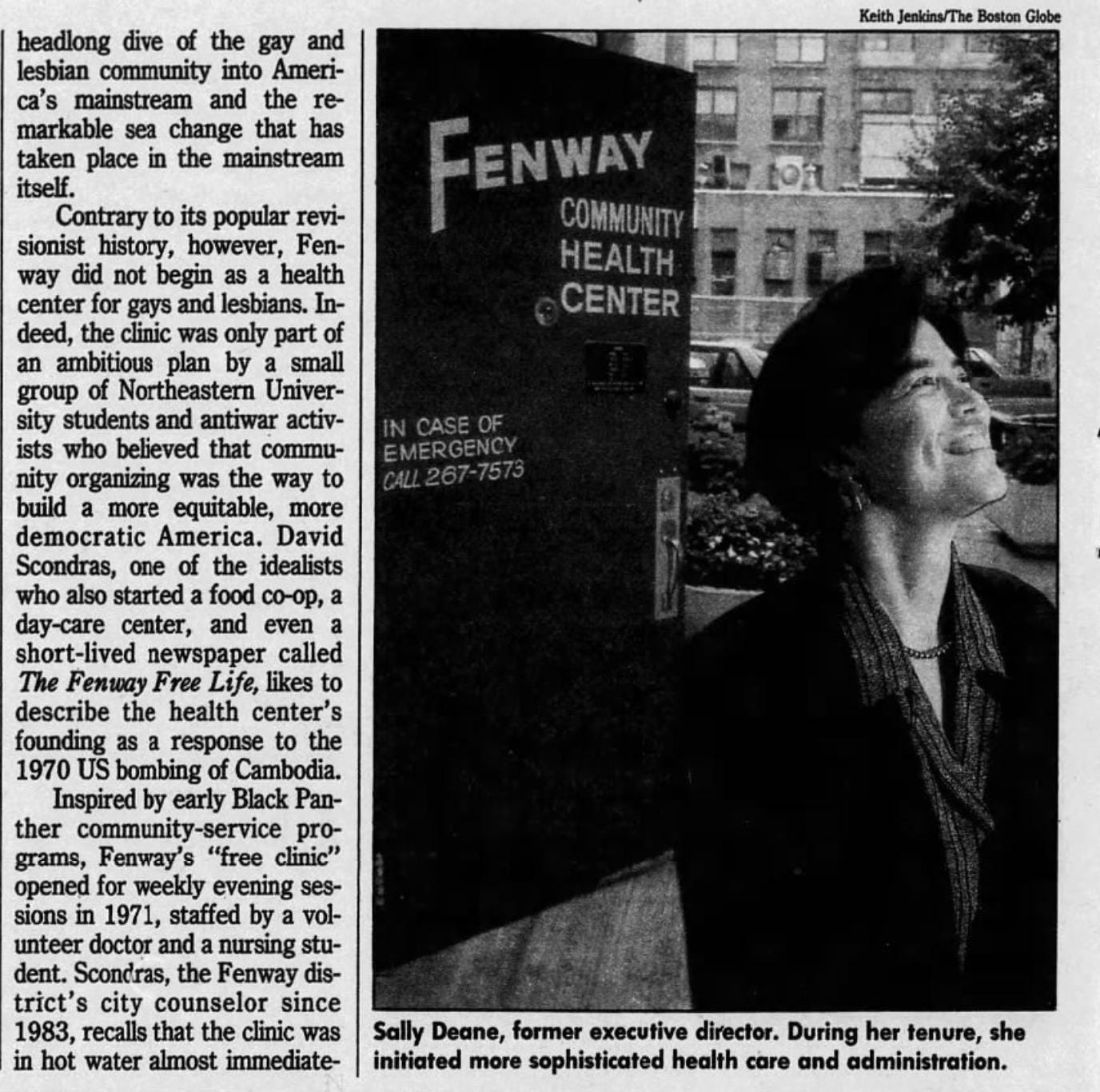A Line Must Be Drawn: The Cowardice Of Historic LGBTQ+ Provider Fenway Health
Fenway Health must return to its roots and care for those the government casts aside.
Last week, devastating news tore through the transgender community: Fenway Health—once one of the most trusted LGBTQ+ clinics in America—announced it would end gender-affirming care for anyone under 19, bowing to pressure from the Trump administration. The rationale was both cynical and cowardly. Fenway claimed it feared that Trump could revoke federal funding on a whim and that by staying in his administration’s good graces, the clinic could protect its resources. In other words, rather than fight an unlawful threat, it chose appeasement. As Timothy Snyder warned in On Tyranny, this is how authoritarianism advances—not through direct orders, but through institutions that “preemptively obey.” By cutting off the very trans youth who helped build its reputation today, Fenway is abandoning their mission. If the line isn’t drawn here, when it’s our lives on the chopping block, who will be left to draw it when it’s theirs?
We’ve seen this kind of preemptive obedience play out across the country. Some hospitals have quietly dismantled their gender-affirming care programs rather than risk litigation—even though the few that have fought back have largely won in court. Universities have instituted discriminatory bathroom and housing bans with only a nudge from Washington, surrendering before a single lawsuit was filed. Administrators and executives, terrified of losing grants or federal favor, are pulling resources from transgender people not because they’ve been ordered to—but because they’ve guessed what might please those in power. But Fenway Health’s decision to cut off transgender youth care marks a breaking point. This was a voluntary act of compliance from an institution that once stood for defiance.
Fenway’s history with the LGBTQ+ community runs deep. Founded in 1971 by activists determined to care for LGBTQ+ people experiencing healthcare discrimination, it began as a grassroots “drop-in” clinic—run not by corporate executives or government bureaucrats, but by volunteers and community organizers serving those society left behind. In its earliest days, Fenway wasn’t buoyed by tens of millions in federal dollars or institutional prestige; it was powered by compassion and defiance. Its founders understood what it meant to be abandoned by the state. They built an institution that drew a line for the most vulnerable, refusing to let government hostility define who was worthy of care.
Fenway has lost its way. One protest poster at one of several demonstrations held outside the clinic read, “Fenway has built their reputation and funding based on supporting the trans community.” Now, after receiving that funding through the years, Fenway is casting aside the transgender people who have come to depend on them for care, in a misguided attempt to appease those in power—without even fighting for the very people who helped them build that reputation and secure that funding. Fenway serves thousands of transgender patients in need, publishes clinical guidance for the care of trans youth, and has been held up as a model for other centers nationwide. To say they’ve built their reputation on transgender care is no exaggeration; they’ve received tens of millions in pledged donations, in part based on their commitment to providing it. Now they have abandoned that commitment.
A line must be drawn. Fenway believes it must preemptively comply because otherwise, the administration could go after its federal funding. Right now, it’s transgender youth care. But what happens when it’s transgender adult care? Would they make the same decision to cut us off rather than fight back? What happens when it’s birth control? What about when it’s treatment for immigrants? What if it’s HIV drugs and PrEP—both of which have already been targeted by this administration? Fenway administrators surely have a line; I assume they would not roll over if told to cut off AIDS and HIV treatments. But they fail to understand that they must draw that line early. To Fenway, I ask: where is your line? Think about the values you claim to hold, and understand this—if you wait until they’ve crossed your line, it’s already too late. You didn’t stand up when they came for us. Who will be there to stand up when they come for you?
Fenway believes that by throwing transgender youth away, it can save care for cisgender LGB people. Trans youth have become a sacrifice Fenway is fearfully willing to make, without an ounce of fight. They are left scrambling to find care elsewhere. But what happens when every clinic makes the same cowardly decision? When every homeless shelter decides it must turn away transgender women to “protect” its funding? When every college decides to ban us from dorms and bathrooms? Where are transgender people supposed to go when the very institutions that built their reputations on our trust betray it—targeting the most vulnerable who depend on them to survive?
Fenway must return to its roots. It was founded to serve those our government targeted and our healthcare system abandoned. Now, it has become an arm of that very system—an agent of exclusion rather than resistance. The clinic that once stood with the vulnerable now stands over them, holding the knife. Fenway can fight. If it did, it would be met with an outpouring of support from the very community that built it. Instead, its leaders behave like servants eager to please their masters, hoping that obedience will spare them. It won’t. This administration will not stop at trans youth; it will come for every marginalized population they treat, every program that challenges its vision of who deserves care. I hope those in power at Fenway hear this and find the courage to fight back. And if they won’t, then the rest of us—the LGBTQ+ community that once made Fenway possible—must stand together and make it clear: you cannot save the house by burning one room and pretending the fire won’t spread.




Kow-towing to bullies never works. Many of us learned that lesson in grammar school, and those of us that didn’t would go on to learn the same lesson later in life, perhaps in advanced schooling or the workplace.
So my question is, what kinds of pressure are being brought to bear on Fenway Health to reverse this decision? Can the Massachusetts AG do anything, perhaps by citing the state’s anti-trans-discrimination laws which are some of the strongest in the country?
Erin - is there anything you (or other influential journalists) can do here to call attention to this horrible situation and get Fenway Health to reconsider? As I recall, several trans care hospitals have caved in the past, only to reconsider in the face of public protests and/or pressure.
1000% Medical institutions need to stand up for evidence and the best outcomes they stood by for decades.
Stop abandoning patients to the twin wolves of fear and ignorance.